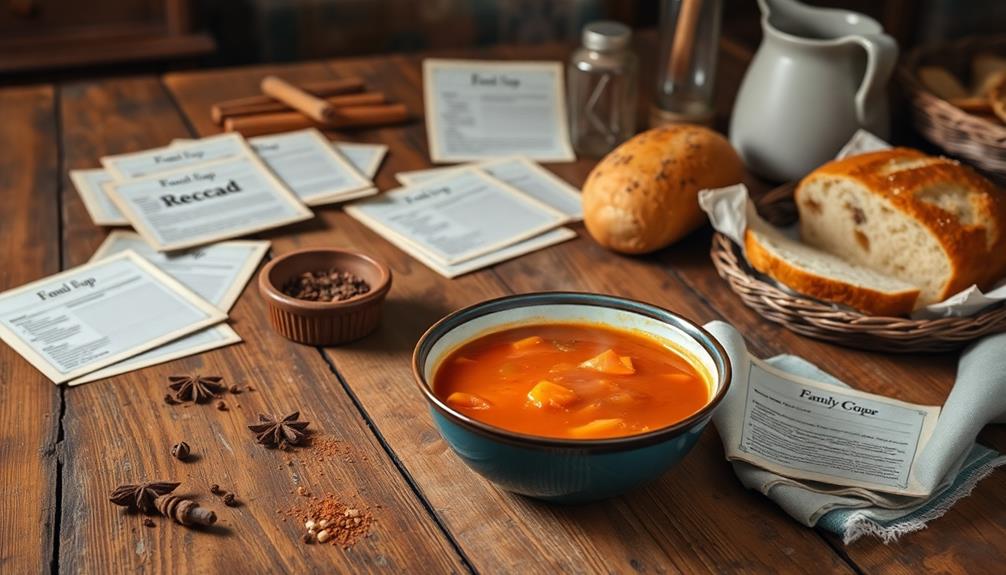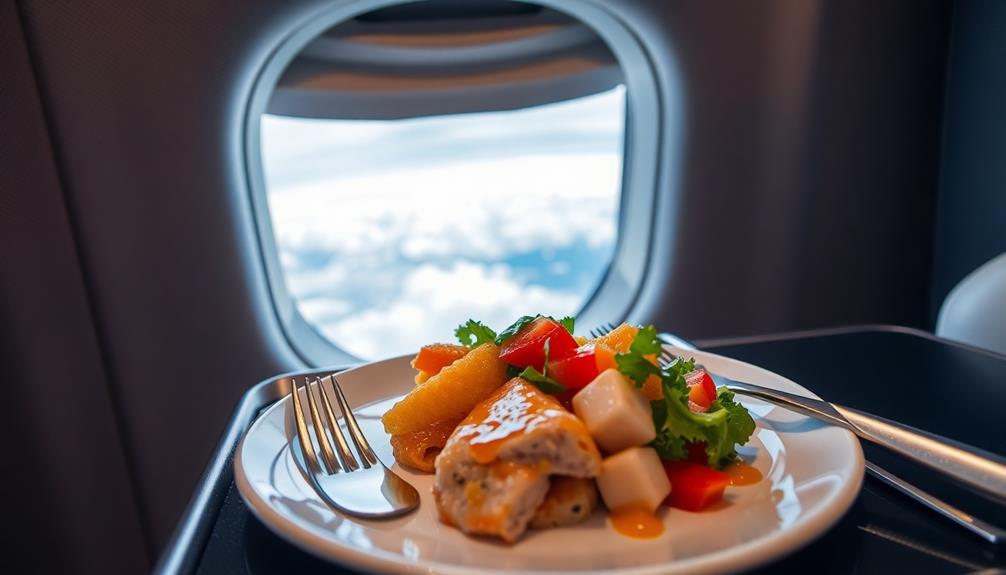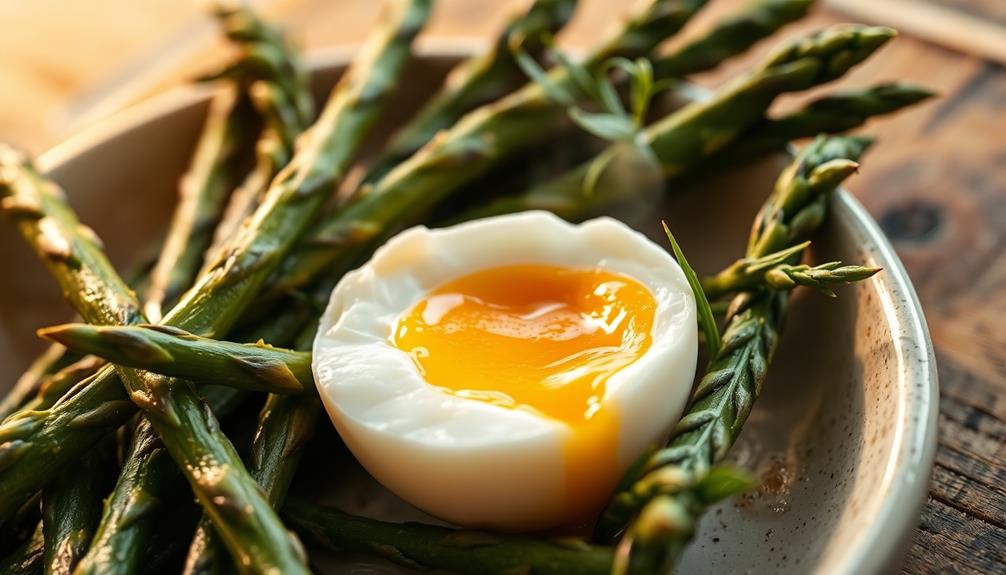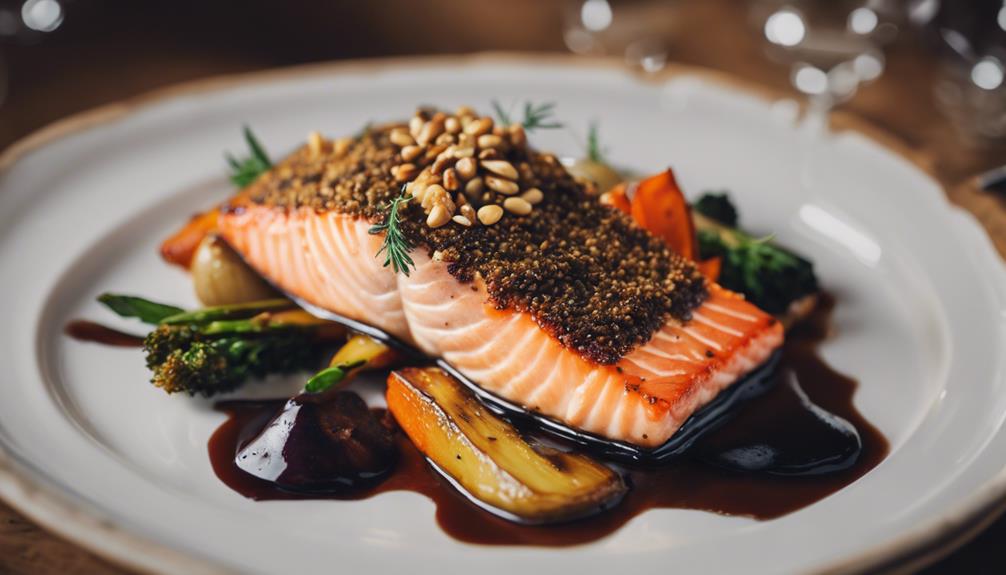Certain foods trigger nostalgia because they activate strong emotional connections tied to your past. When you smell or taste familiar flavors, like fresh cookies or mac and cheese, it often brings back vivid memories of family gatherings or childhood moments. These experiences engage your brain's reward centers, enhancing feelings of joy and belonging. Food not only serves as a comfort but also represents cultural identity, enriching your sense of self. So, the next time you enjoy a nostalgic dish, think about the memories it evokes. There's much more to uncover about this fascinating connection with food and memory.
Key Takeaways
- Specific tastes and smells are linked to emotional memories, activating brain regions associated with nostalgia, like the hippocampus and amygdala.
- Foods often serve as triggers for past experiences, especially those tied to family gatherings and cherished traditions.
- Familiar flavors evoke comfort and safety, reinforcing cultural identity and creating a sense of belonging during stressful times.
- Cooking and sharing nostalgic meals strengthen emotional bonds, fostering intergenerational connections and shared family histories.
- Nostalgic foods can enhance mood and well-being by recalling positive memories associated with loved ones and meaningful life events.
Understanding Nostalgia

Nostalgia is a fascinating emotional experience that connects us to our past, often evoking vivid memories that can bring both joy and sadness. Foods from different cultures, such as traditional Brazilian dishes like Caldeirada, can serve as powerful nostalgia triggers, stirring up memories tied to family gatherings or special occasions.
It's a universal feeling, transcending cultures and ages, and it often surfaces when you encounter certain foods. Comfort foods, for instance, can serve as powerful nostalgia triggers, stirring up memories tied to family gatherings or special occasions.
When you indulge in these familiar flavors, your brain engages multiple regions, like the hippocampus and amygdala, which handle memory storage and emotions. This process can lead to a mix of positive feelings and, sometimes, unpleasant ones, reflecting nostalgia's bittersweet nature.
While you might feel uplifted by happy memories, there's also a chance of experiencing sadness, as you remember what's been lost or changed.
The psychological impact of nostalgia is profound. It can enhance your mood, making you feel connected to your roots, even as it reminds you of the passage of time.
Ultimately, understanding nostalgia helps you appreciate how deeply food intertwines with your memories and emotions, highlighting its unique role in your life.
Triggers of Nostalgia
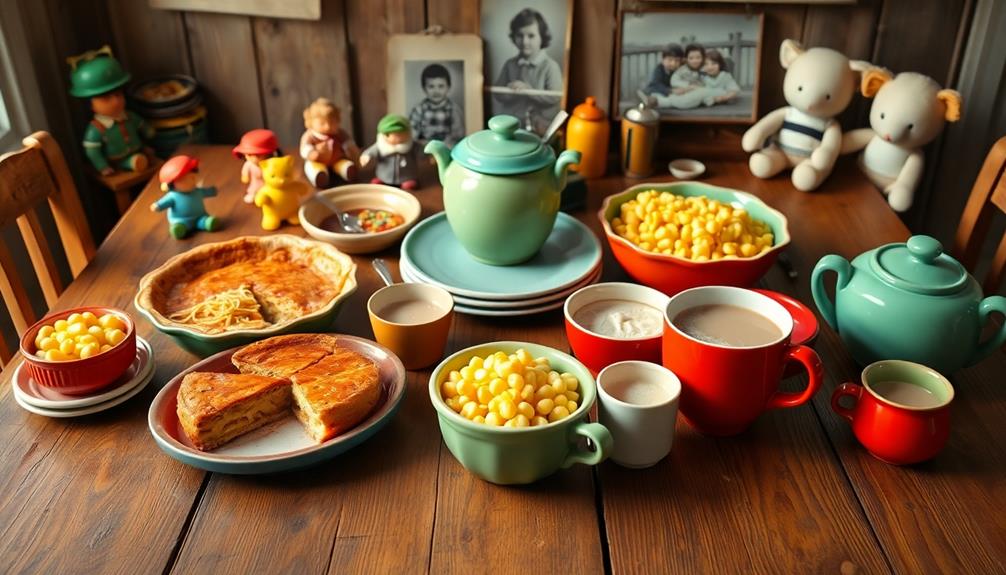
Many factors can spark feelings of nostalgia, bringing back memories that shape who you are. Foods play a significant role as they often remind you of childhood and comfort. Conversations with family and friends can evoke nostalgia, recalling significant moments shared over meals. Unique objects like photographs transport you back in time, triggering vivid recollections.
| Trigger | Description | Example |
|---|---|---|
| Specific Smells | Scents linked to past experiences | Freshly baked cookies |
| Comfort Foods | Dishes that connect you to warm childhood memories | Mac and cheese |
| Media | Songs or shows that remind you of specific times | 90s sitcom theme songs |
| Conversations | Talks about shared experiences with loved ones | Family dinner stories |
| Unique Objects | Heirlooms or mementos that evoke memories | Grandparent's recipe book |
These sensory triggers elicit strong emotional responses, often used in psychological therapy to explore and connect with your past. By embracing these triggers, you can deepen your understanding of your memories and the emotional ties that bind you to them.
Food-Evoked Nostalgia
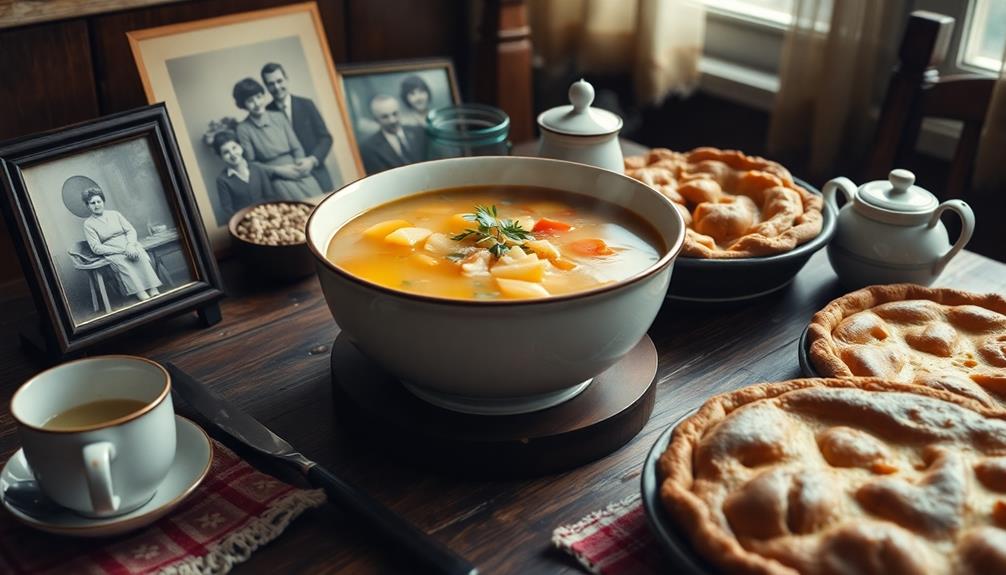
Food has an incredible ability to transport you back in time, evoking cherished memories with just a single bite or aroma. This phenomenon, known as food-evoked nostalgia, triggers emotional responses tied to positive past experiences.
Think about the smell of homemade meals wafting through the kitchen; it's often the olfactory system that links those scents to your happiest moments. Dishes like squash casserole or chocolate gravy can bring back memories of family gatherings and celebrations, making those flavors even more meaningful.
Nostalgic foods, like childhood favorites or culturally significant dishes, can remind you of family gatherings and traditions, reinforcing your cultural identity. Psychological studies reveal that recalling these cherished moments can alleviate stress and anxiety, ultimately enhancing your overall well-being.
When you indulge in these nostalgic treats, you're not just savoring a meal; you're reconnecting with your past, reliving joyful experiences, and strengthening familial bonds through shared culinary experiences.
Food-evoked nostalgia isn't merely about taste; it's about the profound emotional connections that these flavors bring, reminding you of who you're and where you come from.
Culinary Time Travel
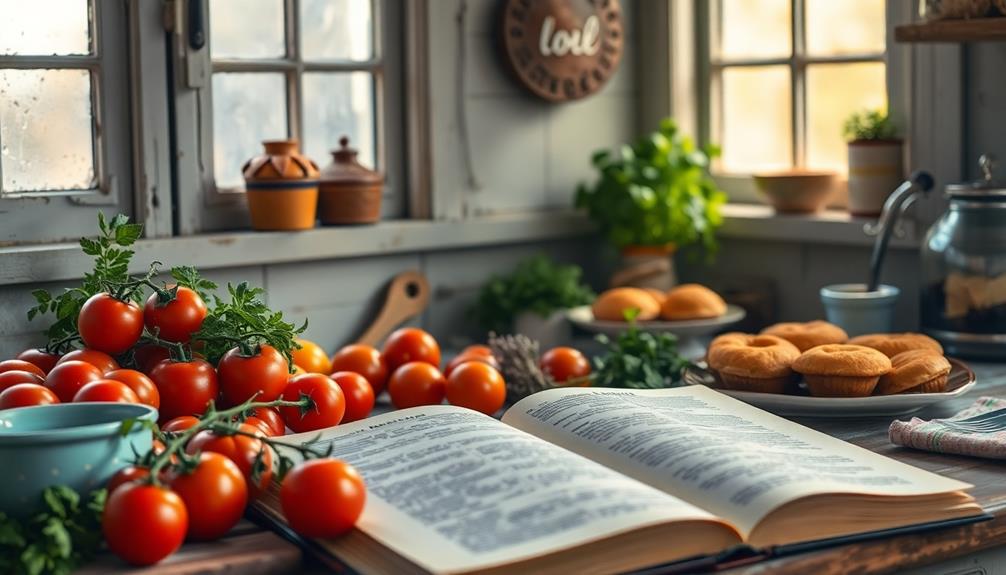
When you taste a familiar dish, it can instantly transport you back to cherished moments from your childhood.
For instance, the comforting flavors of Chilaquiles or the warmth of homemade tamales can evoke vivid memories of family gatherings and celebrations.
Cooking and sharing those traditional recipes not only sparks warm memories but also strengthens your emotional bonds with family and heritage.
Every bite becomes a connection to your past, reminding you of the joy and comfort those flavors once brought.
Taste as Memory Trigger
Biting into a familiar dish can instantly whisk you away to cherished moments of your past, a phenomenon often called "culinary time travel." The connection between taste and memory runs deep, as illustrated by Marcel Proust's famous madeleine, which reveals how a single flavor can open up a flood of vivid recollections.
Nostalgic foods often hold the power to evoke emotional recall, allowing you to relive significant moments and reconnect with your roots. For instance, the rich flavors of Mushroom Masala or the comforting sweetness of Rasgulla can transport you back to family gatherings.
The influence of taste has profound connections to your family traditions and cultural identity. When you savor traditional recipes, you engage in a sensory experience that enhances feelings of joy and belonging. In today's fast-paced world, where opportunities for reflection are limited, the act of preparing and enjoying nostalgic dishes becomes even more significant.
Here are some ways taste serves as a memory trigger:
- Rekindling childhood memories
- Celebrating family traditions
- Strengthening cultural identity
- Reliving significant moments
- Enhancing emotional recall
Embrace culinary time travel and discover how certain foods can transport you back to those treasured experiences.
Emotional Connections to Food
Nostalgia often finds its way into our hearts through the meals we've shared and the flavors we've savored. The emotional connections we hold with food often serve as a powerful bridge to our past. Think about the comforting aroma of your childhood kitchen or the unique flavors that transport you back to a family gathering. These culinary experiences evoke memories that shape your identity.
| Flavor | Emotional Connection | Childhood Memory |
|---|---|---|
| Chocolate Cake | Celebrations and happiness | Birthday parties |
| Chicken Soup | Healing and warmth | Sick days with family |
| Spaghetti | Family gatherings and laughter | Sunday dinners |
When you cook or share traditional dishes, you engage all your senses, creating a rich tapestry of memories. Those familiar flavors not only remind you of who you are but also reinforce your cultural heritage. In times of stress, these comforting foods can evoke feelings of safety and belonging, reminding you that you're part of something greater. By revisiting these flavors, you're not just savoring a meal; you're setting out on a journey through time.
Cooking Familiar Dishes
There's something magical about cooking familiar dishes that lets you revisit cherished memories and emotions. When you engage in this culinary time travel, you don't just prepare food; you reconnect with your past.
The act of cooking traditional recipes, such as Kawarma or Harisseh, often evokes strong sensations, transporting you to significant moments in your life. The sensory experience of taste and smell plays an essential role in this process, as these senses are intricately linked to memory.
Each bite brings back vivid recollections, reinforcing your identity and cultural connection. In our fast-paced world, where opportunities for nostalgia can be scarce, cooking familiar dishes becomes a treasured pause for reflection.
Here are some ways cooking can trigger nostalgia:
- Familiar smells that remind you of home
- Traditional recipes passed down through generations
- Sharing meals with loved ones
- Celebrating cultural heritage through food
- Savoring flavors that spark joyful memories
Personal Food Memories
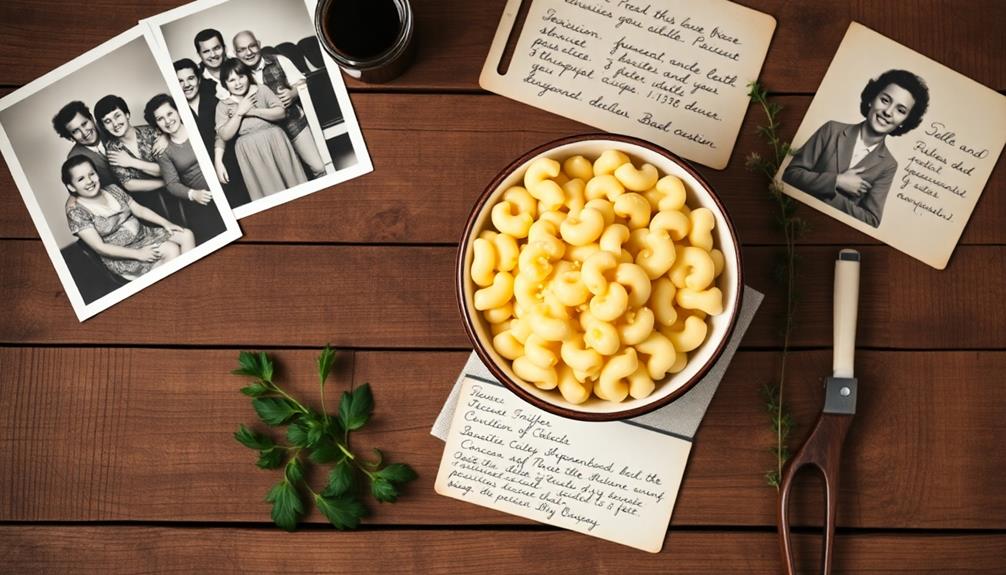
Food often serves as a powerful trigger for memories, transporting you back to cherished moments from childhood. Think about your childhood favorites, like Hostess treats, that evoke intense nostalgia and remind you of family gatherings or special events.
These food memories are often tied to family recipes, which carry emotional significance and reinforce your cultural heritage through shared traditions. For instance, traditional sweets like Dorayaki can evoke memories of special occasions and gatherings, reminding you of the joy of sharing desserts with loved ones.
Consider dishes like ragout, which may hold deep connections to your family history, enhancing the richness of your personal experiences. Each bite can spark memories of your loved ones, making those flavors unforgettable.
When you think about these meals, it's clear how they shape your cravings and influence your dietary choices. Positive food experiences can lead to a longing for those comforting dishes, while negative ones might create aversions that stick with you. For example, childhood favorites or meals shared during special occasions often generate a sense of nostalgia, making you crave them during times of stress or emotional need. On the other hand, the science behind food cravings shows that physiological factors, such as nutrient deficiencies or hormonal changes, also play a key role in driving what and when you want to eat. Understanding these influences can help you make more conscious decisions about your dietary habits.
Ultimately, your personal food memories serve as a tapestry of shared moments and emotions, creating a sense of belonging. They remind you that food isn't just sustenance; it's a vessel for connection, carrying the weight of your family's legacy and the stories that define you.
The Power of Taste and Smell
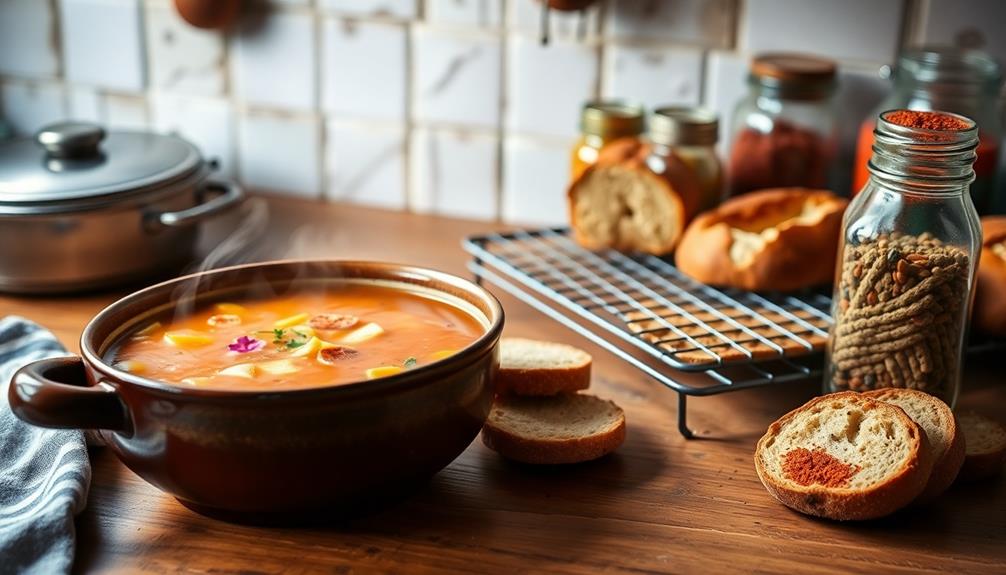
The power of taste and smell can transport you back to moments long forgotten, creating vivid memories with just a single whiff or bite. When you encounter familiar aromas, they engage your sensory system, triggering emotional responses tied to cherished experiences. This connection stems from the olfactory system's close relationship with the brain's memory centers, making certain smells potent nostalgia triggers.
For instance, the rich aromas of traditional dishes like Muamba De Galinha or the sweet scent of Mandazi can evoke memories of family gatherings and cultural celebrations.
Consider how different aspects of taste and smell intertwine to evoke powerful memories:
- Comfort foods often carry unique aromas and flavors.
- Specific scents can remind you of family gatherings or childhood.
- The Proust phenomenon illustrates how a taste can release involuntary memories.
- Nostalgic foods stimulate the brain's reward centers, boosting happiness.
- Engaging multiple senses enhances the depth of your memories.
As you savor a beloved dish or breathe in a comforting aroma, you tap into a well of emotional memories. These sensory experiences not only enhance your enjoyment of food but also create lasting connections to your past, allowing you to recall those moments filled with warmth and joy.
Insights From Interviews
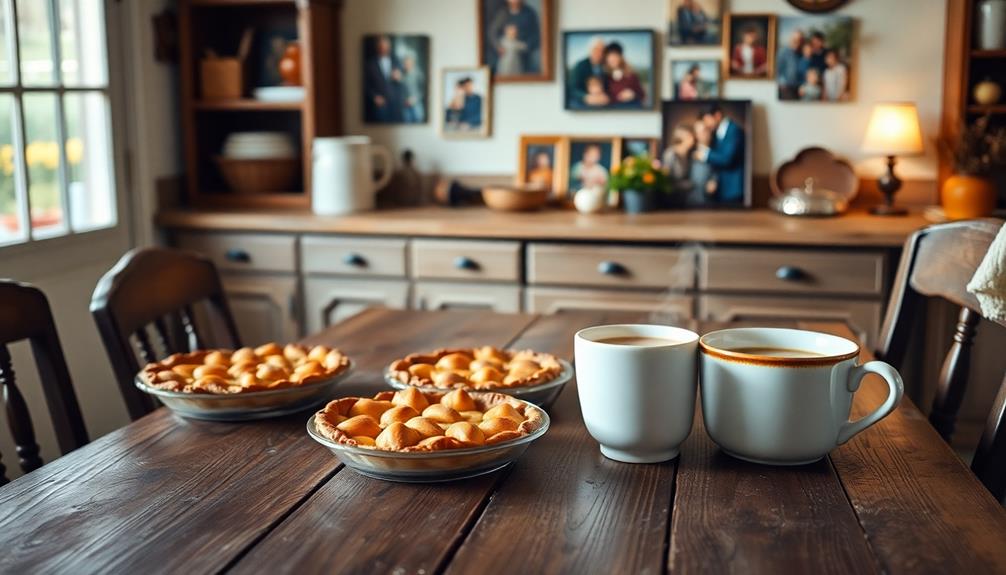
When you think about your favorite childhood meals, do certain dishes bring back warm memories?
For many, traditional foods like Horiatiko Psomi (Country Bread) evoke a sense of comfort and nostalgia tied to family gatherings.
Interviews with Australians show that these food associations are deeply tied to cultural heritage and emotional well-being.
Childhood Food Associations
Nostalgic meals often serve as a portal to cherished memories, transporting individuals back to their childhoods. Many Australians shared how specific foods tied to their upbringing greatly influence their mood and emotional well-being. You might recall the joy and comfort of homemade meals or traditional holiday treats, illustrating how food connects to cherished family memories. For instance, Turkey Sandwiches made from leftover turkey can remind families of holiday gatherings and the warmth of shared meals.
Consider these insights from the interviews:
- The act of recreating childhood dishes evokes feelings of nostalgia and reinforces cultural identity.
- Specific flavors and aromas can transport you back to important life moments.
- Nostalgic foods not only stir positive emotions but also play a role in healing during challenging times.
- Many people find that these meals foster a sense of belonging and community.
- Foods associated with childhood often remind you of the love and care from family.
These connections highlight how deeply intertwined nostalgia, comfort, and memories are with the foods you grew up enjoying.
Cultural Heritage Connections
Food has an incredible ability to connect us to our roots, especially when it comes to cultural heritage. During interviews, many participants shared how traditional family recipes evoke nostalgic feelings, transporting them back to memories of home.
Homemade meals, such as Kue Putu, and holiday treats often embody the cultural practices and family traditions passed down through generations, allowing you to relive those cherished moments.
You might find that cooking and sharing these culturally significant dishes not only boosts your mood but also strengthens your connection to your identity. The emotional resonance of these foods provides comfort and a sense of belonging, especially during stressful times.
It's fascinating how food-evoked nostalgia can remind you of who you're and where you come from.
Through shared culinary experiences, you foster intergenerational connections, passing down beloved recipes to the next generation. As you gather around the table, savoring familiar flavors, you create a bond that transcends time.
Ultimately, these culinary traditions serve as a powerful means of preserving cultural identity, allowing you to celebrate your heritage while forging lasting memories with loved ones.
Emotional Well-being Benefits
Memories tied to cherished dishes can greatly impact your emotional well-being. When you indulge in nostalgic foods, it's like a warm hug for your mood.
Many interview participants shared how these meals, often linked to childhood and family traditions, provide comfort during stressful times. The joy and happiness derived from these dishes can be quite therapeutic. For some, preparing and sharing these meals becomes a grounding ritual that reconnects them with their cultural roots and cherished memories. In fact, several participants mentioned how family gatherings around these dishes often coincided with events like birthdays or appointments for children’s art garden activities, further reinforcing a sense of community and togetherness. The combination of familiar flavors and significant moments helps create lasting bonds and offers solace in periods of uncertainty. For others, the mere act of cooking these meals serves as a reminder that traditions, even in modern times, remain vital threads that tie generations together. Whether during holidays or everyday family dinners, these recipes act as tangible links to the past. Notably, “appointments for children at the garden” or seasonal family events often include the preparation of these dishes, underscoring how food and shared experiences continue to weave culture and connection into family life.
Here are some key benefits of nostalgic foods:
- Boosts Mood: Eating comfort foods can lift your spirits and enhance overall happiness.
- Reinforces Identity: Familiar dishes help you connect with your personal and cultural heritage.
- Creates Positive Memories: Nostalgic meals evoke cherished experiences tied to family and friends.
- Enhances Social Connections: Shared meals reignite bonds and bring loved ones together.
- Provides Comfort: Familiar flavors create a sense of safety and belonging.
Ultimately, these food traditions play a crucial role in your emotional well-being, offering a pathway to joy and connection.
Cultural Significance
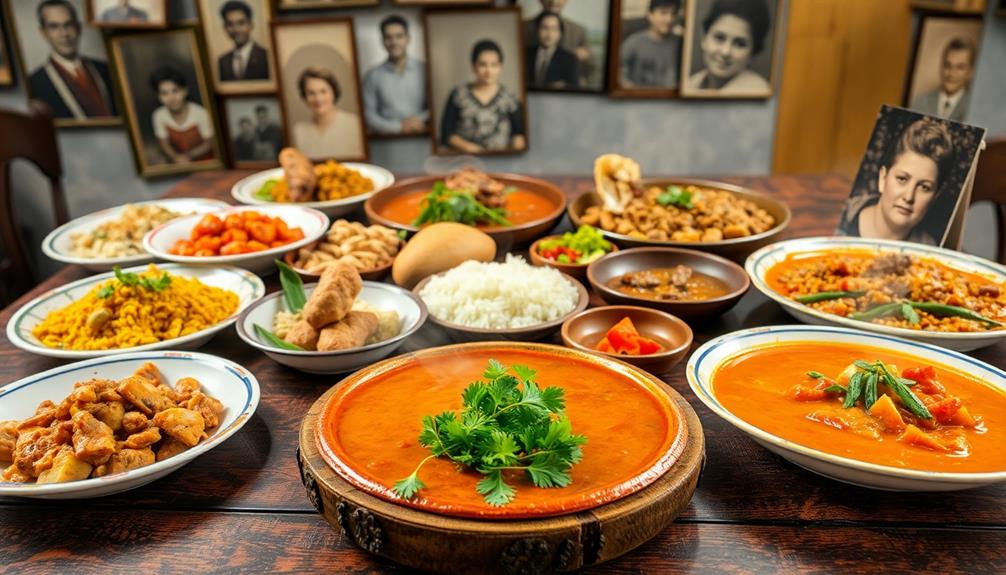
Cultural significance often lies in the dishes that remind you of home and family gatherings. Nostalgic foods are more than just meals; they carry historical significance and weave family stories that connect you to your cultural identity.
Think about how festivals and holidays often center around traditional dishes, evoking collective memories and reinforcing shared traditions. These communal experiences, whether during a holiday feast or a community event, enhance social bonds and deepen your sense of belonging.
As globalization of cuisine continues to blend flavors and recipes, you might find yourself exploring nostalgic foods from your heritage, preserving cultural practices that might otherwise fade. These meals not only evoke personal memories but also foster intergenerational connections within families.
When you share a dish passed down through generations, you're not just enjoying a meal; you're participating in a rich tapestry of culture and tradition.
In essence, every bite of a beloved dish serves as a reminder of who you are, where you come from, and the stories that shape your identity. Embracing these traditional dishes helps guarantee that cultural legacies endure for future generations.
Future Applications of Nostalgia
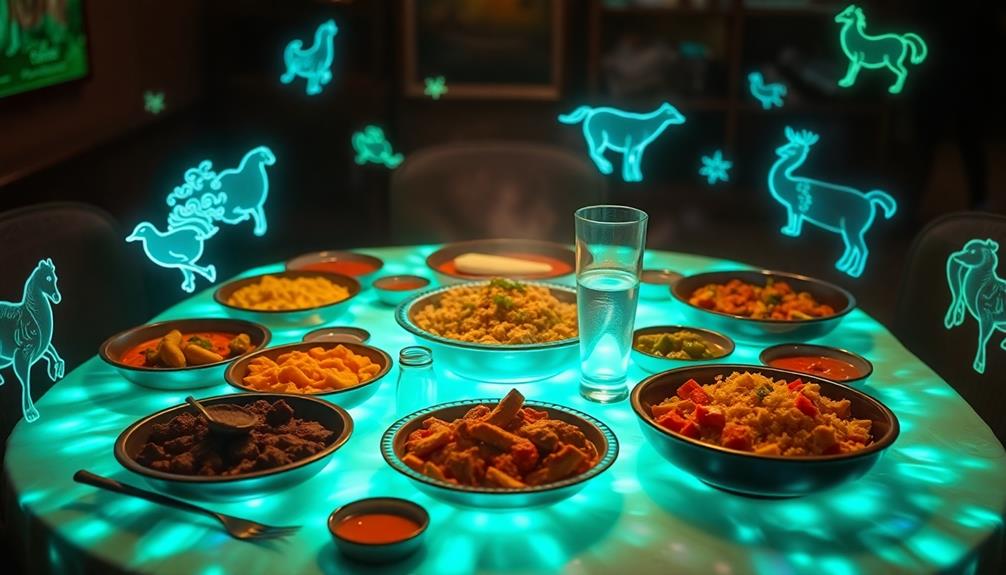
Harnessing the power of nostalgia can open new pathways for enhancing mental health and well-being. By tapping into food-related memories, you can create therapeutic experiences that foster emotional wellbeing. For instance, psychological therapy may incorporate nostalgia to alleviate stress and anxiety, using comforting foods as anchors for positive memories.
Consider these potential applications:
- Dementia Support: Utilizing familiar foods to help patients retrieve lost memories.
- Therapeutic Programs: Designing workshops that focus on food nostalgia to promote emotional resilience.
- Cultural Exploration: Understanding food-evoked nostalgia across cultures to deepen connections to identity and heritage.
- Community Events: Organizing gatherings centered around nostalgic foods to strengthen social connections and community bonding.
- Mental Health Strategies: Developing initiatives that encourage the sharing of food memories to enhance collective mental health outcomes.
As research evolves, these applications can greatly contribute to mental health strategies, enriching lives through the comforting embrace of nostalgia.
Frequently Asked Questions
What Food Makes You Nostalgic?
You might feel nostalgic for your grandmother's homemade apple pie, its warm spices reminding you of family gatherings. Each bite transports you back to laughter, love, and those cherished moments spent together around the kitchen table.
Why Do Certain Things Trigger Nostalgia?
You walk into a sunlit kitchen, the scent of warm cookies wrapping around you. Certain things trigger nostalgia because they connect you to cherished memories, stirring emotions and transporting you back to those beautiful, fleeting moments.
Why Do Certain Foods Bring Back Memories?
Certain foods bring back memories because they're often tied to significant experiences in your life. When you taste or smell them, your brain connects those flavors to moments, evoking feelings of joy and nostalgia.
When It Comes to Food, What Comes to Mind as Nostalgic?
Nostalgic foods hit your heart like a warm hug. You might think of grandma's homemade cookies or the smell of Sunday roast. Each bite transports you back, rekindling cherished memories and comforting traditions you hold dear.
Conclusion
As you savor that familiar dish, remember the saying, "You are what you eat." Food doesn't just nourish your body; it connects you to cherished memories and moments from the past. Those tastes and smells have the power to transport you back in time, evoking emotions and stories long forgotten. So, next time you indulge in a beloved meal, embrace the nostalgia it brings and let it remind you of the rich tapestry of your life.
